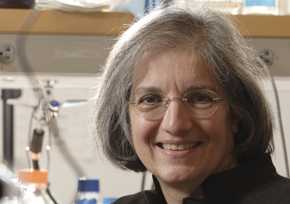Dyann F. Wirth
Professor Dyann F. Wirth has been a major leader in malaria research for more than 30 years. Recognizing the importance of bringing cutting-edge genomic science to the study of infectious diseases, she joined the Broad Institute of MIT and Harvard shortly after its establishment to lead its infectious diseases initiative. Today, the Wirth laboratory blends the scientific environments of the Harvard T.H. Chan School of Public Health, the Broad Institute, and research institutions from across the globe to create a unique malaria research and training network that brings together scientists with expertise in molecular biology, genetics, genomics, population genetics, chemistry, cell biology, epidemiology, computational biology, biostatistics, and leading clinicians in infectious diseases and pathology. Using a multidisciplinary approach, her group explores challenges related to mosquito biology and the malaria parasite.
Leveraging the genomic tools of the human genomic project, the group has applied state-of-the-art technologies and novel approaches to better understand the fundamental biology of the malaria parasite, evolution, and mechanisms of drug and insecticide resistance. This work has provided completely new insight into how the malaria parasite has evolved, specifically in the areas of population biology, drug resistance, and antigenicity. The group’s current efforts seek to determine both the number and identity of genes expressed by the parasite in response to drug treatment and to evaluate the role of these genes for parasite survival. This work aims to understand basic molecular mechanisms in protozoan parasites. Current findings have made significant contributions to advancing our understanding of malaria vaccine efficacy with long-term R&D goals to discover and apply preventive and therapeutic interventions against malaria infection. The group’s research activities are made possible through collaborative research partnerships with investigators, universities, and clinical centers in Africa, Asia, and the Americas.
In addition to her research and teaching efforts, Wirth directs Harvard’s Defeating Malaria: From the Genes to the Globe Initiative, a university-wide effort to produce, transmit, and translate knowledge to support the control and eradication of malaria. She is a member and chair of the World Health Organization’s Malaria Policy Advisory Committee, fellow and past president of the American Society of Tropical Medicine & Hygiene (ASTMH), fellow of the American Academy of Microbiology, and elected member of the National Academy of Medicine of the National Academy of Sciences. Wirth is past chair of the Department of Immunology and Infectious Diseases at the Harvard Chan (2006–2018) and honored recipient of ASTMH’s Joseph Augustine LePrince Medal, BioMalPar’s Lifetime Achievement Award, and USF President’s Global Leadership Award. She is a past board member of the Burroughs Wellcome Fund and the Marine Biological Laboratory.
Selected Links
Harvard Integrated Life Sciences (HILS) Program

